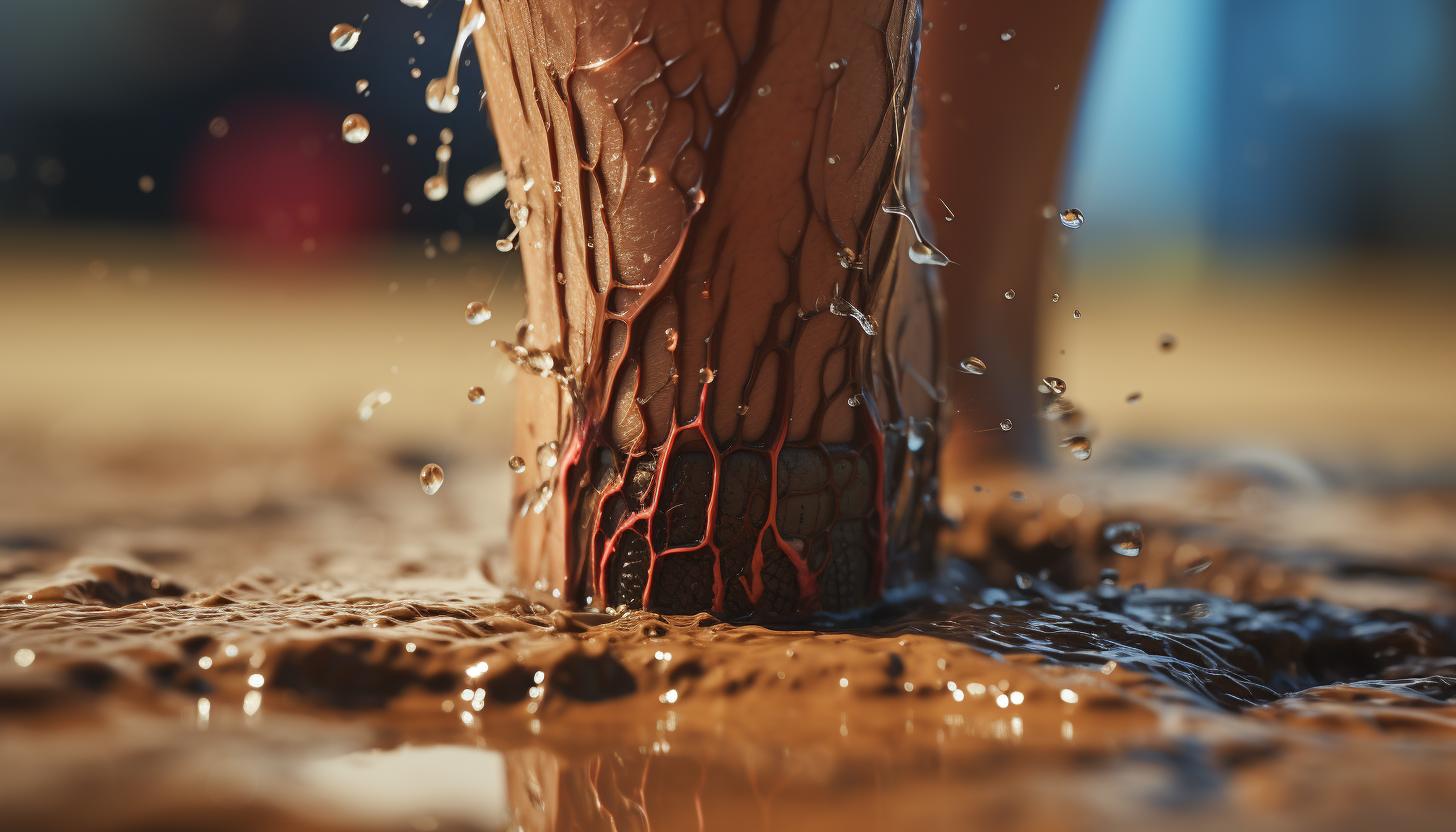Hydration and Performance: How Dehydration Affects Your Running

Imagine running a marathon on a scorching summer day, your body feeling like a desert devoid of water. Your performance suffers, your muscles cramp, and fatigue sets in earlier than expected. Why? Because dehydration has taken its toll.
In this article, we delve into the fascinating relationship between hydration and performance, exploring how dehydration affects your running. Based on scientific research and proven facts, we provide you with practical strategies to maintain proper hydration during your runs and optimize muscle repair for enhanced recovery.
The Importance of Hydration for Runners

Proper hydration is crucial for runners to maintain optimal performance. As a runner, you need to understand the role of electrolytes in hydration and how it impacts your endurance.
Electrolytes are essential minerals, such as sodium, potassium, and magnesium, that help regulate fluid balance in your body. When you sweat during exercise, you lose not only water but also these vital electrolytes. This loss can disrupt the delicate balance necessary for proper muscle function and overall performance.
Research has shown that dehydration can have a significant impact on endurance. Even mild dehydration can impair your running performance by reducing blood volume and increasing heart rate. It can also lead to decreased cognitive function and increased fatigue during prolonged exercise.
To optimize your hydration strategy, it’s important to replenish both fluids and electrolytes lost through sweating. During longer runs or intense training sessions, consider using sports drinks or electrolyte supplements that contain sodium and other key minerals to replace what you’ve lost.
Remember that hydrating properly isn’t just about drinking water; it’s about maintaining the right balance of fluids and electrolytes in your body. Make sure to listen to your body’s cues for thirst and drink according to those signals. Additionally, practice your hydration strategy during training runs so that you’re prepared for race day.
Understanding the Effects of Dehydration on Performance

It’s important to grasp the impact of not staying properly hydrated while running on your overall athletic abilities. Dehydration can significantly hinder your performance and lead to negative outcomes. Understanding the effects of dehydration is crucial in order to prevent it and optimize your hydration strategies. Here are three key points to consider:
– Decreased endurance: Research shows that even mild levels of dehydration can impair exercise performance, particularly endurance activities like running. When you’re dehydrated, your blood volume decreases, which means less oxygen-rich blood is delivered to your muscles. This leads to decreased aerobic capacity and diminished endurance.
– Impaired cognitive function: Dehydration doesn’t just affect your physical performance; it also impairs cognitive function. Studies have shown that dehydration negatively impacts attention, concentration, and decision-making abilities. This can be particularly detrimental during races or intense training sessions where mental focus is crucial for optimal performance.
– Increased risk of heat-related illness: Running in a dehydrated state puts you at a higher risk of heat-related illnesses such as heat exhaustion or heat stroke. When you’re dehydrated, it becomes more difficult for your body to regulate its temperature, leading to overheating and potentially dangerous situations.
To prevent dehydration and optimize your running performance, it’s essential to implement effective hydration strategies. Stay tuned for the next section where we will discuss the signs and symptoms of dehydration in runners.
[Transition] Now that you understand how dehydration affects your running performance, let’s explore the signs and symptoms that indicate when you may be experiencing dehydration during your runs.Signs and Symptoms of Dehydration in Runners

Now that we’ve covered the effects of dehydration on running, let’s take a look at the signs and symptoms that runners may experience when they are dehydrated. Recognizing these warning signs is crucial for preventing further complications and optimizing performance. Here are some common indicators of dehydration in runners:
| Signs and Symptoms | Description | Prevention Methods |
|---|---|---|
| Thirst | Feeling thirsty indicates that you are already dehydrated. Make sure to drink fluids regularly during your runs to prevent this. | Carry a water bottle or use hydration packs for easy access to fluids. Avoid waiting until you feel thirsty before hydrating. |
| Dry Mouth | A dry mouth is a clear sign of dehydration. Stay hydrated by sipping water throughout your run, especially in hot weather conditions. | Use sports drinks with electrolytes to replenish lost minerals and help maintain fluid balance during longer runs or intense workouts. |
| Fatigue | Dehydration can lead to fatigue, making it harder to sustain energy levels during your runs. Hydrate properly before, during, and after exercise. |
By paying attention to these warning signs and implementing prevention methods such as carrying water bottles or using hydration packs, sipping water regularly, using sports drinks with electrolytes, and monitoring fluid intake before running, you can significantly reduce the risk of dehydration during your runs.
Now let’s delve into strategies for maintaining proper hydration during your runs
Strategies for Maintaining Proper Hydration During Your Runs

To stay adequately hydrated during your runs, make sure you regularly drink fluids and replenish lost minerals with sports drinks containing electrolytes. Hydration plays a crucial role in your performance as a long-distance runner, and implementing effective hydration strategies can help optimize your race day performance.
Here are three key strategies to maintain proper hydration during your runs:
– Hydrate before, during, and after: Start hydrating well before the race begins to ensure you are properly hydrated when it matters most. During the race, aim to drink approximately 5-10 ounces of fluid every 15-20 minutes to replace fluid losses. After the run, continue hydrating to restore any remaining fluid deficits.
– Monitor urine color: Your urine color can serve as an indicator of your hydration status. Aim for a pale yellow color, indicating that you are well-hydrated. Dark yellow or amber-colored urine may suggest dehydration and should be addressed promptly.
– Individualize your hydration plan: Every runner has unique sweat rates and electrolyte needs. Experiment with different hydration strategies during training runs to find what works best for you. Consider factors such as weather conditions, exercise intensity, and duration when determining how much fluid and electrolytes you need.
By implementing these evidence-based strategies into your training and racing scenarios, you can enhance your performance by ensuring optimal hydration levels throughout races.
Remember that staying properly hydrated is not only important for maintaining performance but also for promoting overall health and reducing the risk of heat-related illnesses during long distance running events.
Hydration and Recovery: How Dehydration Impacts Muscle Repair

Make sure you replenish lost fluids and electrolytes after your runs to support muscle repair and optimize your recovery. Proper post-exercise hydration is crucial for effective muscle regeneration and overall performance improvement.
When you exercise, especially during intense workouts or long runs, your body loses both water and essential electrolytes through sweat. Failure to adequately replace these fluids can lead to dehydration, which negatively impacts your body’s ability to repair and rebuild muscle tissue.
Research has shown that dehydration impairs protein synthesis, a critical process for muscle repair and growth. Inadequate fluid intake after exercise can slow down this process, prolonging recovery time and hindering performance gains. Additionally, dehydration can disrupt the balance of electrolytes in your body, leading to muscle cramps, fatigue, and decreased exercise capacity.
To optimize muscle regeneration post-workout, it is recommended to consume fluids that contain both water and electrolytes such as sodium and potassium. Sports drinks or homemade electrolyte solutions are effective options for replenishing lost fluids and maintaining proper hydration levels. These beverages provide the necessary nutrients to restore electrolyte balance while promoting optimal rehydration.
In conclusion, prioritizing post-exercise hydration is vital for supporting muscle repair after running sessions. By replenishing lost fluids and electrolytes through appropriate fluid intake strategies, you can enhance the recovery process, minimize muscle damage, reduce fatigue levels, and ultimately improve your overall running performance.
Remember to implement these practical recommendations into your training routine for optimal results in real-world scenarios.
Conclusion
In conclusion, proper hydration is crucial for optimal running performance. Dehydration can have significant negative effects on your body and hinder your ability to perform at your best.
It is essential to be aware of the signs and symptoms of dehydration, such as fatigue and muscle cramps, in order to address them promptly.
By implementing practical strategies like drinking enough fluids before, during, and after runs, you can ensure that you stay properly hydrated.
Remember, hydration is the key to unlocking your full potential as a runner – don’t let dehydration hold you back!






